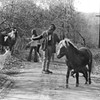Published August 21, 2002 at 4:00 a.m.
The most poignant moment of last summer’s Montréal World Film Festival came on a sultry Friday night, when thousands of people squeezed behind barricades on a section of Ste-Catherine closed to traffic. As Yugoslavian actor-director-bassist Emir Kusturica’s No Smoking Orchestra cranked out its trademark “gypsy techno-rock,” the lead singer invited about a dozen young women at random onto the stage. In thickly accented, off-kilter English, he asked each of them: “Where are you coming from?”
“Bosnia,” replied one, speaking into the microphone.
“Serbia,” said another.
“Sarajevo,” a third girl proclaimed.
The shoulder-to-shoulder crowd cheered every time. Some cried. After so many years of war and ethnic cleansing in the Balkans, the seemingly peaceful diversity of these émigrées in Québec suggested there was hope for humankind after all. Art can bring a measure of harmony to shattered lives. At an international film festival, the global sweep helps put complex issues in perspective.
Last August’s outdoor concert followed a screening of Kusturica’s documentary about a No Smoking Orchestra tour of fractured Eastern Europe. Festival selections from various trouble spots — Albania, Croatia, Macedonia, Israel, Lebanon, Iran — gave the event an added sense of immediacy. Even lighthearted pictures often carry a certain gravitas when they come from such turbulent lands.
Post-9/11, gravitas is likely to be the unspoken password at the 2002 extravaganza, which begins this week. The Age of Terror, for example, is a series of four new British television productions that examine violent political, ideological and religious movements from 1945 to the present. The non-fiction Seen But Not Heard, an American/Spanish/German joint venture, looks at the plight of illegal aliens who worked in the World Trade Center.
Seventy-five countries will be represented by 406 films, but they are by no means all topical. Many address everyday subjects like crime, romance, friendship, old age or the follies of youth. Some are even comedies. But much of the escapism at any festival comes with the glitz and glamour of those gainfully employed in the industry. Last year’s personality parade featured Sophia Loren and Jackie Chan; the celebrity roster this time will include actors Robert De Niro and Gérard Dépardieu.
In addition, there’ll be seminars with Jean-Luc Godard, whose Breathless in 1959 helped define the French New Wave. He is one of the last great auteurs from an interantional pantheon that included Federico Fellini, Louis Malle, Francois Truffaut, Satyajit Ray and Akira Kurosawa.
The planet is teeming with moviemakers, and the Montréal fest always manages to pluck a significant number of their projects. The majority of these works, however, will never be released in the United States. That’s as good a reason as any to venture nord before Labor Day.
With spotlights on Japan, Africa and Latin America — 41 movies in all — the array of cultures perfectly suits melting-pot Montréal. From Bangladesh to Moldova, Kurdistan to Vietnam, cinematic storytellers have found ways to spin their yarns on celluloid or video. Watching a drama from, say, Luxembourg is more than a vicarious visit to the tiny grand duchy; it’s a chance to explore a dreamscape of the imagination.
Granted, that dreamscape could become a nightmare in a really bad movie. Festivals are a crapshoot. That’s part of the fun, though. It takes a pioneering spirit to navigate the myriad people, places and possibilities. In perusing this partial list of Montréal options, just keep in mind the fundamental question, “Where are you coming from?”
Fest Facts
The Montréal World Film Festival begins Thursday, August 22, and runs through September 2. Admission prices for the 26th annual event range from $200 passes to $10 individual tickets (Canadian). There are four theaters along Ste-Catherine, plus free nightly outdoor screenings near the Place des Arts.
The program book, with detailed descriptions of every film, costs $20 at the Cinema Parisien. Free schedules — which provide times, dates and a brief synopsis of many selections — are available in Burlington at the Seven Days office (255 S. Champlain St.), Waterfront Video on Battery Street and Burlington College on North Ave. Be sure to check whether the foreign-language fare you want to see has English subtitles!
For more information, call (514) 848-3883, or visit www.ffm-montreal.org.
Mysteries
Crime pays — in the movies. Outlaws and crooks are a perennial favorite in the entertainment business:
‘ City By the Sea — Vincent LaMarca, a cop whose father was executed for kidnapping a child in the 1950s, suspects that his own son might be involved in murder. Robert De Niro plays the lead. Frances McDormand is also in the cast.
‘ 8 Women — When a family patriarch is killed in this whodunit, the suspects are an array of lovely French ladies portrayed by Catherine Deneuve, Fanny Ardant, Danielle Darrieux, Isabelle Huppert, Emmanuelle Béart and Virginie Ledoyen. It’s by Francois Ozon, who directed last year’s sorrowful Under the Sand.
‘ Step By Step — Police in Brussels believe Hubert is a drug dealer who has massacred his entire family, but during an interrogation he gets advice from the ghost of a dead crime boss.
‘ O Delfim — In Portugal during the 1960s, the deaths of two people and the disappearance of another with his dog bring detectives to a rural estate. Barking sounds can sometimes be heard in the distance.
‘ The Last Witness — Cops investigating a case in which the body of an elderly man is found floating in a river uncover dark secrets from 20th-century South Korean history.
‘ Copycat Killer — While a Japanese serial murderer taunts police and the media with clues, incriminating evidence found in a car wreck convinces authorities that they’ve solved the case.
Bloody Conflicts
A gripping tragicomic tale about genocide and fratricide in the former Yugoslavia, last year’s No Man’s Land went on to win an Academy Award in March for best foreign-language film. Some of the most powerful movies on the current roster strive to tweak our consciences:
‘ The War — Chechen rebels demand a sizeable ransom for two touring British actors they’re holding hostage. Director Alexei Balabanov seeks to demonstrate that Russia’s scorched-earth policy of retaliation is as reprehensible as Chechnya’s terrorist tactics in their endless struggle over the breakaway republic.
‘ Eat, Sleep, No Women — A German filmmaker looks at how American bombing in Afghanistan might have affected citizens elsewhere: Egypt, the Amazon, Pakistan, Paris and China, for example.
‘ The Clay Bird — As political upheaval spreads through the region, Anu is sent away to an Islamic religious school because his father wants to shelter the boy from Hindu influences in Bangladesh.
‘ In Nowhereland — Sukran is an Istanbul mother searching for her missing son. The crisis is linked to the age-old antipathy between Turkey and its oppressed Kurdish population.
‘ Marooned in Iraq — An elderly man living in Iran crosses the border to look for his ex-wife in the Kurdish enclaves of Iraq, where Saddam Hussein’s bombs continue to fall.
‘ Boxed — A priest in Northern Ireland abducted by the IRA to hear the last confession of a suspected informer turns the tables on his captors.
‘ Boomerang — This black comedy centers on the surreal atmosphere of a Belgrade tavern run by black-market arms dealers.
Nazis and Fascists
Destruction waged by tyrants, despots and dictators has long fueled the screenwriter’s trade, which can work wonders with history’s most heinous episodes:
‘ Invincible — The legendary Werner Herzog (Fitzcarraldo) offers the profile, circa 1932, of a real-life Jewish circus strongman hired to entertain in a show run by an illusionist who worships Hitler. Brit actor Tim Roth (Reservoir Dogs) stars in this saga about propaganda and moral responsibility.
‘ Monsieur Batignole — In German-occupied Paris, a gentile butcher moves into an apartment vacated when its Jewish occupants were taken away; but he soon becomes involved in helping children from the doomed family escape to Switzerland.
‘ Carol’s Journey — While her father fights with the International Brigades during the Spanish Civil War in 1938, a 12-year-old girl raised in New York goes to the embattled nation to visit her mother’s rural hometown.
Growing Up
It may take a village to raise a child, as Hillary Clinton suggested, but it takes a persuasive narrative to give a movie soul:
‘ I Am Dina — This Norwegian “radical melodrama,” as one critic described it, concerns a girl in the mid-1800s who accidentally causes her mother’s death and becomes a pariah to her father.
‘ Everyone Loves Alice — A 12-year-old Swedish girl tries everything to keep the family together after her father has an affair with a neighbor.
‘ Hold My Heart — A divorced father in Norway decides to kidnap his 7-year-old daughter to repair their damaged relationship.
‘ A Hidden Life — When Biela’s father dies, the Brazilian teen-ager must live on a farm with relatives. She rebels against an aunt who insists on “civilized” manners.
‘ I’m Taraneh, 15 — While her father’s in jail, an Iranian adolescent learns that she’s pregnant and her fiancé is leaving for Germany.
‘ Mr. Bones — Raised by the Kavuki tribe of South Africa, an orphaned white boy is taught how to divine the future.
‘ Libre — Hor, an 11-year-old shepherd, leaves his own war-torn African country and winds up in Senegal. He hopes to avoid the grim fate of street kids in the teeming capital city of Dakar.
Love Hurts
Emotional anguish is easier to endure when it’s happening to characters on the big screen:
‘ Salome — (pictured above) Veteran Spanish director Carlos Saura’s fascination with dance continues. A contemporary ballet company choreographs the quasi-Biblical tale, in which a seductive Galilee princess is ogled by her stepfather/uncle, King Herod, who has sinned by marrying his dead brother’s wife. John the Baptist meets an unpleasant fate.
‘ Hatzozra Bavadi — An Arab and a Jew, though both Israelis, face innumerable obstacles when they fall for each other.
‘ Days — In Italy, an HIV-positive banker falls for a seductive younger man.
‘ Supplement — Polish director Krzysztof Zanussi examines the confusion of a medical student tempted to join a monastery. His girlfriend feels as if she’s an obstacle in his quest for self-fulfillment.
‘ Lily Festival — A group of elderly Japanese women are charmed by the 75-year-old ladies’ man who moves into their apartment building, even though they realize he’s a cad.
‘ Rustling Landscapes — Twentysomething Luka goes to the Slovenian countryside to think about his difficult relationship with a young woman back home. She follows him, and things deteriorate.
Ecological Disasters
Both realistic and futuristic visions of doom sometimes emerge from the creative minds of those who think in pictures:
‘ La Turbulence des Fluides — When the tides stop flowing on the St. Lawrence River, a seismologist stationed in Tokyo comes to a small Canadian town to investigate the phenomenon. Some believe the anomaly signals an impending global earthquake. From Québec, this is the festival’s opening-night film.
‘ The Voice of Ljudmila — A pregnant woman’s fireman husband responds to the 1986 catastrophe at the Chernobyl nuclear plant.
‘ Kabala — The sacred well in a remote Mali village has become polluted. A young man, returning home after four years in exile, must maneuver around local superstitions to prevent an outbreak of cholera.
‘ The Stone Raft — Following some spooky omens, Spain and France break apart. The Iberian peninsula floats out to sea. Tourists panic. Expect genuine chills in this film by George Sluizer, who also directed the brilliant original version of The Vanishing in 1993.
Yearnings
Unfulfilled desire — for a decent life, liberty and the pursuit of happiness — sustains the tension necessary to keep us riveted to the big screen:
El Ultimo Tren — Uruguay’s national pride is at stake when a Hollywood honcho tries to buy one of the Latin American country’s last 19th-century locomotives to use in his next picture. When some old railway aficionados hijack the train, they’re hailed as folk heroes.
‘ My Brother Silk Road — Four children from the mountains of Kyrgyzstan make their way to some railroad tracks in hopes of hopping a train to a better life.
‘ Nearest to Heaven — Fanette thinks she has spotted Philippe, a man she once loved. While in New York, she receives a mysterious letter inviting her to meet at the top of the Empire State Building, à la An Affair to Remember and Sleepless in Seattle. Could it be him? The cast includes William Hurt and Catherine Deneuve.
‘ La Chant de la Noria — When 30-year-old Zeineb divorces her husband, her new-found freedom is hampered by Tunisian marriage laws that are entwined with formidable social and religious traditions.
Stranger in a Strange Land
How much of identity is linked to place? When uprooted, we may lose our sense of self and, if lucky, gain a new understanding:
‘ Lazaro’s Girlfriend — A Cuban woman who has relocated to Spain to join her fiancé learns that he’s a drug addict in jail for attempted rape.
‘ The Black Garment — A prostitute from a small Indian town is bewildered by the crow. Then her pimp finds religion.
‘ The Heart of the Bear — Nika, an Estonian, resettles in Siberia to eke out a living as a hunter. He becomes immersed in the mythical world of the region’s forest tribes. It’s a co-production from Estonia, Germany, Russia and the Czech Republic.
‘ Kedma — A boatload of Jewish refugees, arriving in Palestine one week before Israel becomes an official state in 1948, must confront harsh realities in the so-called Promised Land.
‘ Anansi — Drawn by the promise of a high standard of living and satellite dishes, a group of West Africans flee their impoverished circumstances by making a perilous transcontinental trek to Germany. Reggae star Shaggy sings the theme song, “Why Me, Lord?”
‘ Paris Selon Moussa — A village in Guinea sends a local farmer out of the country to buy a motorized pump in France, but half his money is stolen when he hits Paris.
‘ Rabbit-Proof Fence — Kenneth Branagh appears in this fact-based adventure directed by Phillip Noyce (Clear and Present Danger) about three “half-caste” girls walking 1200 miles across Australia, trying to return to the home they were forced to leave. The white-ruled government once sent Aboriginal children to institutions. In this case, a professional tracker is hired to find the escapees, who have no food or water.
Category-Defying
Quirky films are in. Even Hollywood is churning them out by the dozen. These oddball entries might enchant viewers and start their own trends:
‘ I Am Bolivar — The scripts are bad for a popular Colombian TV soap opera about the great Simon Bolivar. So the program’s star wants to achieve authenticity by recruiting the long-dead, early 20th-century South American liberator.
‘ Britney Baby: One More Time — An unscrupulous indie filmmaker, Dude Schmitz, shoots clandestine footage of a gay Britney Spears impersonator named Robert, intending to pass him/her off as the real thing. They take a road trip to New Orleans, theoretically to meet Robert’s idol. Dude is played by Mark Borchardt, a frequent guest on David Letterman and director of the no-budget 1997 horror flick Coven — which was in turn the subject of the engrossing 1999 documentary American Movie.
‘ Absolut Warhola — This is an excursion to the remote and downtrodden town of Medzilaborce in Eastern Slovakia, which hosts a pop-art museum. The place is a shrine to “native son” Andy Warhol (his parents were Czech immigrants in Pittsburgh). Local folks, including his aunts and cousins, are proud of him but only vaguely aware of what his legacy signifies in faraway America.
More By This Author
Speaking of...
-

Beta Technologies Opens Satellite Office in Montréal
Mar 9, 2023 -

Holiday Shopping for Food in Montréal
Dec 2, 2015 -

Pirate-Themed Ropes Course
Oct 1, 2015 -

Surveying Indian Eats in Montréal
Sep 29, 2015 -

Alice Eats Lebanese Flatbread
Sep 22, 2015 - More »
Comments
Comments are closed.
From 2014-2020, Seven Days allowed readers to comment on all stories posted on our website. While we've appreciated the suggestions and insights, right now Seven Days is prioritizing our core mission — producing high-quality, responsible local journalism — over moderating online debates between readers.
To criticize, correct or praise our reporting, please send us a letter to the editor or send us a tip. We’ll check it out and report the results.
Online comments may return when we have better tech tools for managing them. Thanks for reading.












































